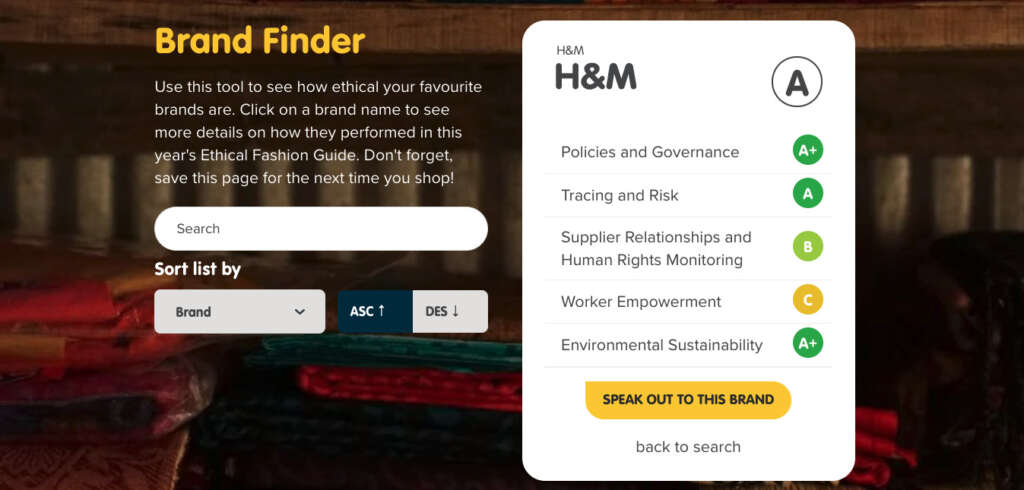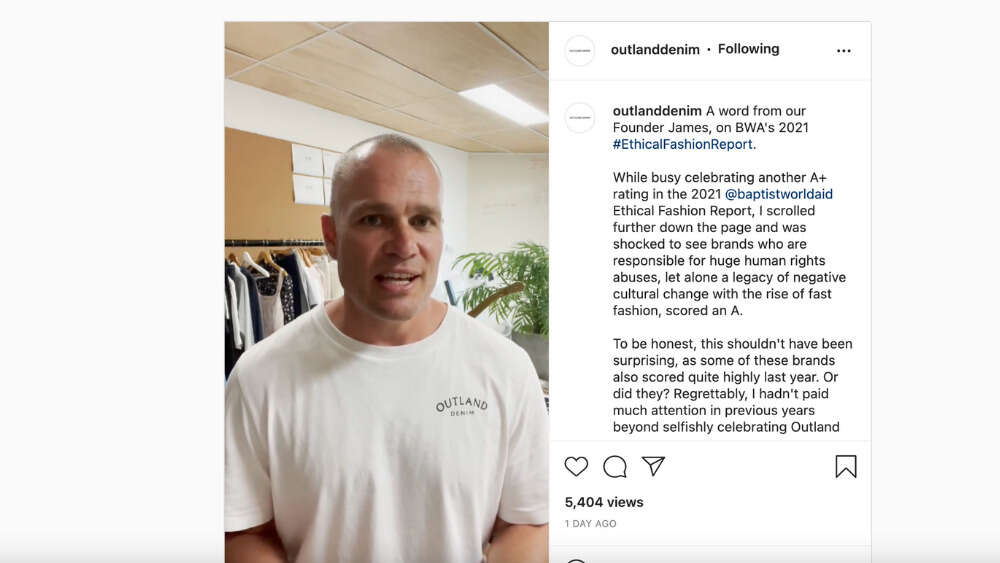Outland Denim's founder calls for removal of Ethical Fashion Guide over its scoring system
Outland Denim founder James Bartle has posted an Instagram video saying he has “fairly major concerns” with Baptist World Aid’s Ethical Fashion Report and hopes it can be removed and revised before being re-released.
Bartle says he was “shocked to see brands who are responsible for huge human rights abuses, let alone a legacy of negative cultural change with the rise of fast fashion, scored an A”.
“[The report] is marketed as a guide as to how to shop better and we then see these brands with these ratings of A. Yet some of these brands aren’t even meeting basic human rights needs of living wages and it’s for that reason I have a problem with a way the grading system works with this report,” Bartle explains in the video.
Outland Denim received an A+ on the report, alongside Etiko, Joyya Apparel, and Mighty Good Basics, so this is not a complaint about his own company’s report card.
And, Bartle says he does believe that Baptist World Aid (BWA) is “doing a great job in moving the industry in the right direction and we can see that in the report – we can see that brands have moved to improve their practices.” Hence, his criticism is also not a rejection of ethical fashion reporting or guides more generally.
“I believe this report is potentially one of the greatest setbacks to the ethical and environmental sustainability movements I’ve witnessed in the past 10 years” – James Bartle, Founder, Outland Denim
Instead, Bartle says his concern is that the report’s scoring system creates a false impression of a brand’s ethics and can be used as a kind of “green-washing” – the process of conveying a false impression or providing misleading information about how ethical a company’s products are (usually, environmentally).
The Ethical Fashion Report’s scoring system grades brands over key measurables in five areas and provides each brand with an average grade. Brand’s raw scores are also published.
“How is it possible that certain brands score so highly, and yet have a reputation of exploitation on both social and environmental levels? For example, under one of the five scoring categories, Worker Empowerment, any score above a C would lead me, and I assume most people who read it, to believe that these companies pass on one of the most important factors in “Ethical Fashion”, living wages. Unfortunately, I don’t believe this to be the case,” he wrote in the video’s caption.
“This leads me to make this statement. I believe this report is potentially one of the greatest setbacks to the ethical and environmental sustainability movements I’ve witnessed in the past 10 years,” he said.
“I fear most shoppers looking to use the guide will unknowingly be supporting brands that are not in alignment with their own values and, once again, these fashion giants will leap ahead and use this report as a powerful greenwashing tool.”
Bartle said he hoped the report could be “removed and can be refined and can be put back up so that we all have a very clear and transparent understanding of where brands are doing well and where they’re not doing well.”
Bartle revealed he had called BWA’s Director of Advocacy, Peter Keegan, to share his concerns before publicising his criticism.
“I was nothing but impressed with his humility and obvious commitment to fight for the vulnerable. I have confidence that Peter and his team are fighting for the same reasons my team and I are, along with thousands of others, though we are coming from different corners,” Bartle wrote.
He added that he “appreciate[d] the strategy” behind what he understood to be BWA’s strategy “to encourage and spur our industry to strive for better”.
“However, it leaves already exploitative brands with one of the highest endorsements in the ethical reporting ring.”
As Eternity’s article on the release of the guide and report last week mentioned, the report itself draws attention to the same industry problems Bartle raises. This includes the small percentage of companies that have made a public commitment to paying workers a living wage (15 per cent) and that know where any of their raw materials come from (36 per cent).
In addition, this year’s report provides the industry’s underlying raw average score, highlighting the severe problems that still exist throughout the industry.
“For the first time this year we are publishing the underlying mean score for the industry,” the report reads.
“At 33.6 out of 100, this average may startle some readers. It is broadly consistent with the trends from recent year— and in fact follows slow but continuous improvement over the eight years since we started publishing this report. It is nevertheless a reminder that there is still a long way to go.”
A revised Ethical Fashion Guide which, as Bartle suggested, graded every Australian company that failed to demonstrate they were paying living wages below a ‘C’ grade overall, would duly highlight the commendable work of those A+ companies like Outland Denim. But exactly how useful would it be to consumers who want to encourage their favourite brands to follow in the footsteps of Australia’s ethical fashion pioneers?
“So many of the challenges that are being highlighted – particularly issues like living wages – are ones that we put front and centre in the report and said, where the industry is at the moment, is not good enough,” – Peter Keegan, Director of Advocacy, Baptist World Aid
BWA’s Director of Advocacy Peter Keegan told Eternity today that BWA has a lot of confidence in the approach and methodology used in the Ethical Fashion Report and believes it is a robust and sound approach to get at the key issues facing the industry.
“So many of the challenges that are being highlighted – particularly issues like living wages – are ones that we put front and centre in the report and said, where the industry is at the moment, is not good enough,” he said.
Keegan revealed that, as stated in the report, only 4 per cent of companies surveyed could demonstrate that they were paying living wages.
“So across the board, the industry’s not at the level that it should be to deliver good outcomes for workers. Almost all the industry still has the challenge of living wages in front of it. So that’s, that’s a measure that unfortunately, as consumers, we can know that almost every brand still has to address that. But some brands are making moves in that direction.”
“Our research approach and the grades that we communicate, try to highlight those companies that are making those steps,” Keegan explained.
“They may not be there. In fact, again, we’re quite transparent in identifying the underlying scoring bands that relate to each grade, and you can see that even those companies that are getting A’s and B’s have a very long way to go to have a fully sustainable and ethical supply chain. But they’re getting those grades because they’re starting to put in place some of the systems and some of the measures that have the promise of delivering that.”
Keegan said these companies had shown the Ethical Fashion Report‘s researchers evidence of the measures they already have in place and are moving towards throughout their supply chains – and that’s why they are graded more highly than others.
With BWA’s focus on shifting the whole industry and making ethical fashion accessible to every Australian, their approach is something of a balancing act. Hence, their report attempts to balance recognising the need for the whole industry to improve, celebrating those companies that are doing well and prioritising this, and getting behind the others, saying, “you need to be better. You need to keep pushing for greater progress and improvement in what you’re doing.”

An online search by a shopper looking for a brand’s grade – provides a grade on five key areas, an overall grade and the opportunity to contact the brand with the click of a button.
That said, Keegan acknowledged that The Ethical Fashion Guide is “always an exercise in taking what is a complex piece of research” – over a hundred pages of information and research – “and trying to simplify that down in a way that’s meaningful for consumers to be able to pick up and take action, and to use that to drive change, not just in what they buy, but changing the way that the industry operates.”
When asked how long it takes for a company to resolve an issue such as low wages in a supply chain, Keegan replied that he didn’t want “to let any brands off the hook because, at the end of the day, that’s workers who are not being paid fairly, so every brand has a responsibility to act to act immediately.”
Yet, he also acknowledged that it’s a complex undertaking that requires a lot of work and consultation – a lot of engagement with other stakeholders – to truly deliver.
“It’s actually quite a complex challenge for brands to deal with because most of the brands operating in Australia are sourcing from facilities where they won’t be the only buyer from that facility.,” he explained.
“So they have a lot of leverage and they can use the way that they purchase products and the way that they agree to their contracts to ensure that they’re putting that pressure back onto the suppliers – and not just the pressure, but also the resources, the fair price to be able to deliver that living wage.”
When it came to Bartle and the Outland Denim brand he founded, Keegan was highly positive.
“We recognise that the brands who get A+, including Outland Denim, are the ones who’ve put ethical purpose at the center of their business. They provide a pathfinding example of what it can look like and the difference that you can make. And so we celebrate what they do and we don’t want to undermine that in any way at all. We’re open to their criticism and we’re open to the feedback – to taking that on board and improving and strengthening what we do.”
Email This Story
Why not send this to a friend?



